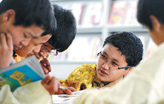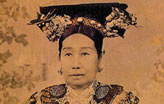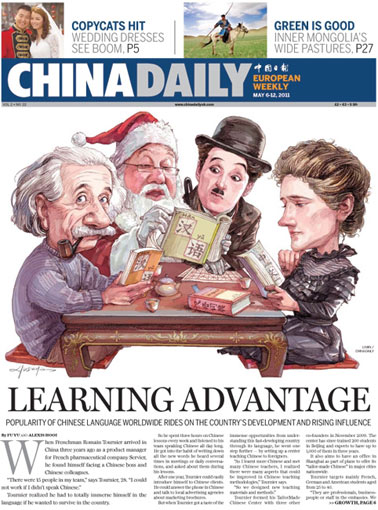Op-Ed Contributors
Speaking the same language
Updated: 2011-05-06 17:18
By Danny Vincent (Chinadaily.com.cn)
Sometimes when living in China, an intriguing scenario pops up when I am forced to speak Chinese to another non-native speaker.
Not in a classroom, but in a real life situation where the only way I can communicate and solve an impending problem is to speak in Mandarin. It does not happen to me often in Beijing, but when it does it opens a window in my mind that questions what the world would be like if Chinese was the lingua franca.
China is taking over the world. Its re-emergence throws up many questions. It is now the second-largest economy, with some predictions it could become the biggest before the end of the decade.
It is the factory of the world and the center of the auto industry. It boasts the world's largest Internet population and it is star bursting in every direction.
Stocks in China are rising and it is time to buy.
That is why thousands of foreigners are flocking to Beijing, in some cases even finishing a university degree to try to cram Mandarin into their young minds. I have met them. Brit and American youngsters writing in Chinese characters before they have even mastered Pythagoras' theorem.
But there are more Chinese learning English in schools in China than Westerners learning Chinese in or outside of the country. The English language industry is booming and it seems here to stay.
English is the world's lingua franca and it is not by chance. Classical Chinese was once the lingua franca for the region where it was the language used for diplomacy across Korea, Japan and Vietnam.
Empires do not tend to just fizzle out. They tend to linger on in some form. They say the Roman Empire transformed into the Catholic Church when its reign ended. English being so popular says something about the old guard.
On the eve of the British royal wedding between Prince William and Kate Middleton, it occurs to me that perhaps the longest lasting legacy of the once far-reaching British empire is the dominance of the English language and the benefits it brings to its speakers.
I came to China in 2008 without speaking Chinese. The difference between being able to speak some and nothing is a big advantage in living and working here as a journalist.
Language is much more than a communication tool. While being conversational in a second language may not be a skill within itself in the fast changing world, it is a way into a world that geography has separated at birth, people like me from the everyday Chinese person on the street.
It is also a way to appreciate different cultures, build relationships and remind us that sometimes, and maybe more often than we care to admit, we have more in common than we have differences.
The best advice I was given when learning Chinese is to not try to learn the language with the intention of competing for work and opportunities with natives. Do not try to become your translator.
Instead, we should use language as a way to enter a culture, build connections and understand society.
When studying any language there are so many things that can never be translated or articulated in your mother tongue.
Language is not the only barrier between people, it is a barrier that is incredibly rewarding when dissolved. They say that China is going through several stages of development simultaneously. Mandarin is the common language between these different worlds.
I recently stumbled upon a young student from Equatorial Guinea, the central African country that uses both Spanish and French as the official languages. She has been living in Beijing for a year studying Chinese. We were both literally lost for words and decided to speak in Mandarin. We were the centerpiece of the street for a few minutes when locals looked on with perplexed amazement.
For our friendship to continue, I guess we both have to adopt Mandarin as our lingua franca.
The author is a journalist living in Beijing
E-paper

War of the roses
European Chinese rose growers are beating their Chinese rivals at their own game
High-tech park gets big boost
At the source
Merchant of Venice
Specials

High-tech park gets big boost
Zhongguancun sets sights on being one of the top technology hubs in the world

Learning to close the gap
Thousands of students have benefited from Tibet middle school program set up outside the autonomous region

The Cixi story
Two books about the Empress Dowager cast new light on the iconic ruler.
